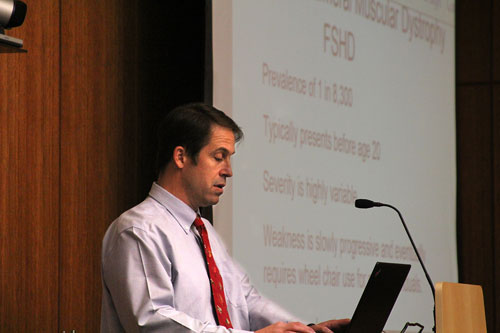Posted by Gregory J Block MSc PhD on Mar 28, 2015

At the MDA scientific conference held in Washington D.C. in March, Dr. Daniel Miller presented his unpublished data on biomarkers in blood (serum) of people with FSHD. This pilot project was funded by Friends of FSH Research in August, 2014, and progress reports have been reviewed by our Scientific Advisory Board.
The fact of the matter is biomarkers are important. Biomarkers are anything that you can be measured that reports how a disease is progressing or responding to treatment.
When it comes to testing a treatment in a clinical trial, you can use a biomarker for two things. First, obviously, is to see if the treatment is working. Second, biomarkers can be used to set criteria for patients entering the trial. This second point is going to be crucial for FSHD, because FSHD has so many different ways of presenting itself despite the fact that the underlying genetic cause is the same. In order to perform a clinical trial reliably, you need to set criteria for patients that can enroll.
Dr. Miller explained that serum biomarkers for FSHD aren’t as cut and dry as serum biomarkers for other diseases. Certain biomarkers are shared in common between FSHD and other muscle diseases. However, these biomarkers are present in much lower amounts in people with FSHD. We think it’s is because the pathology of FSHD is so unique: skeletal muscle wastes more slowly and so far we have not been able to predict the progression of the disease in any given person.
Because the FSHD biomarkers being studied by Dr. Miller are present at lower amounts, he has also come up with a creative way of improving the sensitivity of the measurements. One way to improve precision is to combine different biomarkers, and that’s exactly what Dr. Miller did. He measured over 1200 different proteins for disregulation in FSHD.
The next steps for the study will be to gain long-term data in order to understand how this cohort of biomarkers predicts the changes that occur during FSHD.
Understanding biomarkers is as important if not more important than understanding the drug itself . Without clear biomarkers and readouts for people entering and leaving a clinical trials, we can’t really interpret whether even the most promising of therapies actually works.
Serum biomarkers are not the only way to measure disease progression. Other biomarkers may do an equally good job; however, the more complex the measurement, the more trouble you’re likely to run into. For example, we can measure a lot from a muscle biopsy. But if a serum assay works, that’s a lot less painful!
As we continue to expand our drug discovery pipeline for FSHD, we’re being mindful of the relationship between drug efficacy and the endpoints we use to reach conclusions. After all we don’t want to become one of those communities that has a 90 percent failure rate in bringing therapies to patients.
To learn more about biomarkers, or the research program of Friends of FSH Research please contact me at greg@fshfriends.org





Connect with us on social media